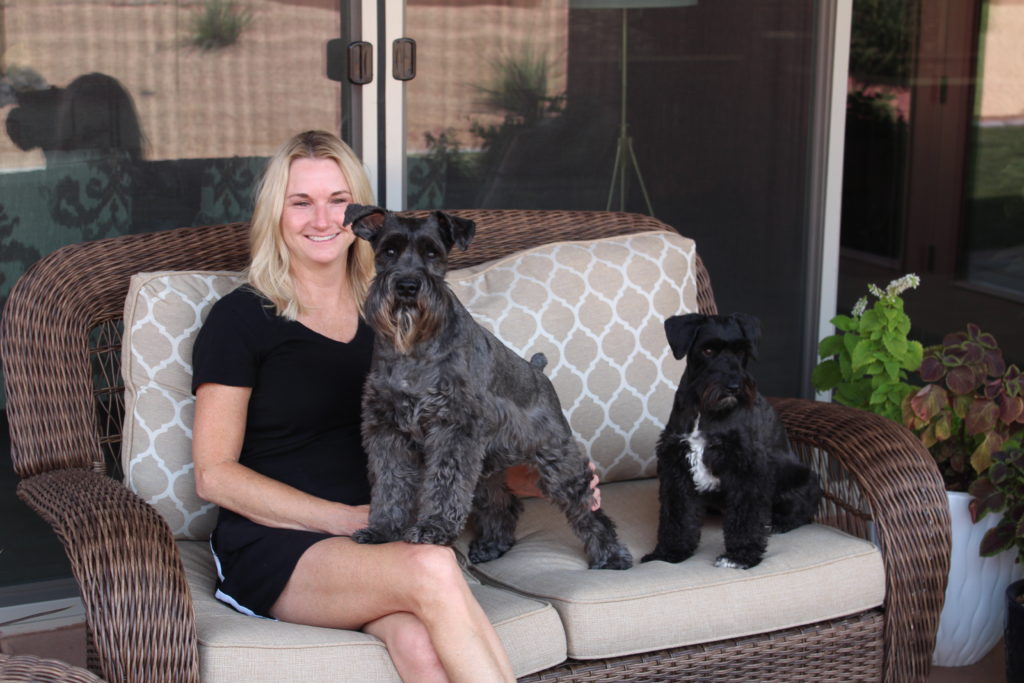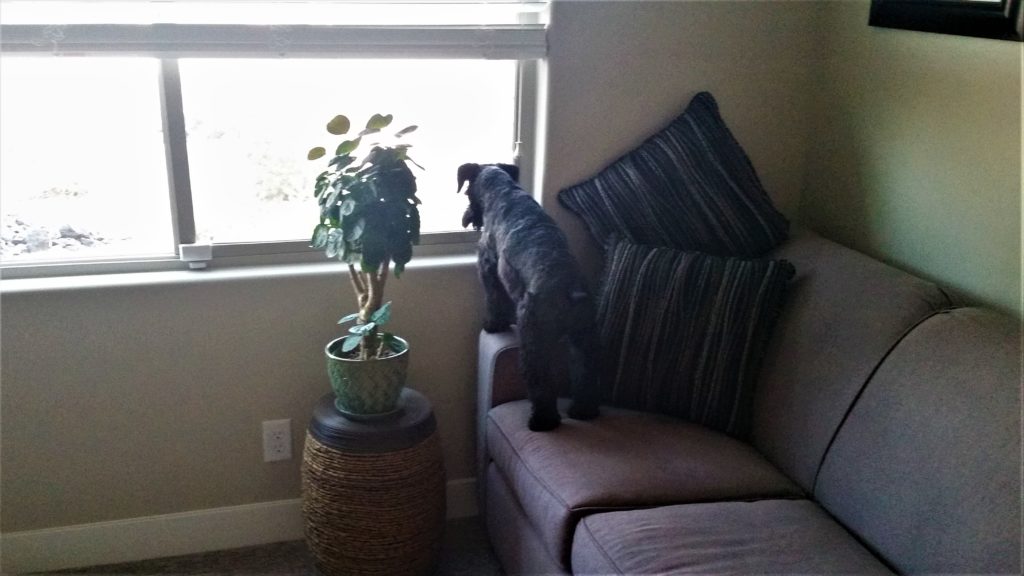Experiences And Lessons Learned Caring For Our Diabetic Schnauzer
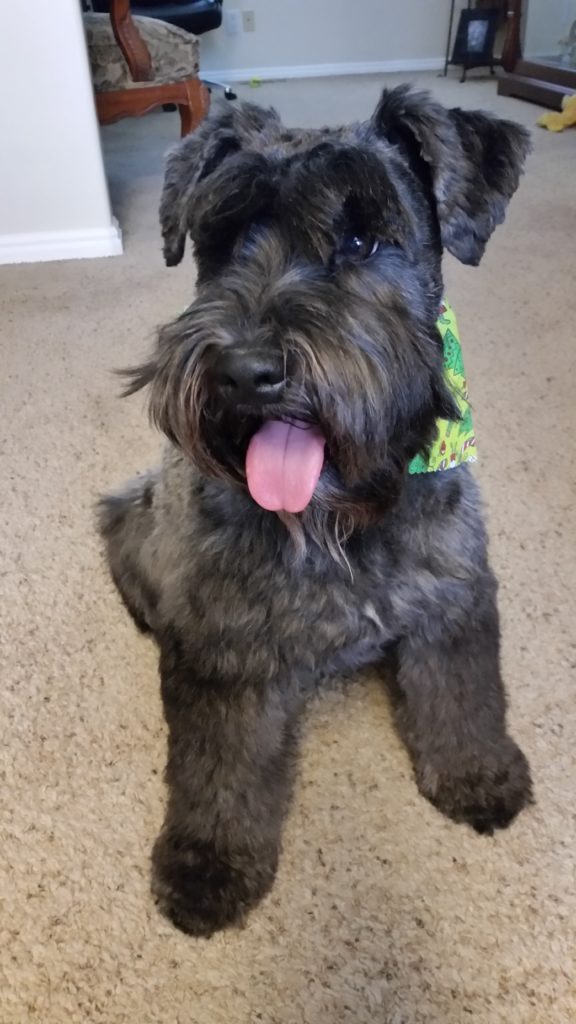
Robin and I feature our dogs on our ‘About Us’ tab. We love both of them very much and consider them our ‘children,’ especially in this phase of our lives when our actual kids are all adults and require less (although some) parental involvement from us. Boston is our older Schnauzer boy and Jordy is his little Schnauzer brother from another mother, Boston will be eight this June and he was diagnosed with diabetes in April 2017.
We’ve been asked a ton of times how we found out that he was diabetic, and it’s a great question. The first indication that something was wrong with Boston was that out of nowhere he started peeing in our house. As a puppy he was a pretty quick learner regarding the whole potty training thing, and probably had it down by the time he was 3 months old. So for six years he was at about 99% in terms of doing his business in the backyard or on walks, and if we were home he always let us know when he needed to go.
And then he began peeing in the house even when we were home, and all of our lives changed from that point forward.
April 2017
We took Boston to our veterinary clinic in Riverton after the peeing episodes, not knowing what in the hell was going on or what to expect. They ran blood tests and urine tests and very quickly were able to diagnose that our furry little kid had diabetes, which basically meant that his body was no longer able to produce insulin necessary to regulate the glucose in his system. At that moment, we did not grasp the ramifications of Boston’s diagnosis. The doctor (veterinarian) did his best to educate us on what the disease could and likely would do to Boston, but it was a crash course and we were probably in denial that such things could happen to our boy.
The possible complications of diabetes in dogs that the doctor explained to us are similar to the complications for humans with diabetes. The list includes, but is not limited to:
- Cataracts (leading to blindness)
- Enlarged liver
- Urinary tract infections
- Seizures
- Kidney failure
The list goes on and on …
The crazy thing is, we absolutely considered ourselves to be very responsible dog owners. Loving dog owners. Dog owners that never missed a vet visit and always kept our dogs up to date on their vaccinations. We took the boys for walks, we praised them and loved them, and we gave them the most nutritious food available. No way in hell one of our boys gets a horrible disease.
Yeah, it was quite the wakeup call.
But there we were. The doctor said that the causes of diabetes in dogs are numerous. They include, but are not limited to:
- Age, most dogs who are diagnosed are 5 years or older
- Diseases, such as pancreatitis, Cushing’s, and autoimmune disorders
- Obesity, which can lead to pancreatitis
- Genetics, some breeds prone to diabetes include Poodles, Pugs, Dachshunds, and you guessed it, Schnauzers
Of those four potential causes of diabetes, Boston checked three of the boxes. He was six years old, a Schnauzer, and he was clinically obese. Robin and I kind of beat ourselves up to this day about that last one. We love Boston and we gave him dog treats (things like milk bones, pupperoni, treats from the counter at PetSmart), human treats like little pieces of meat from dinner, and I gave him the occasional sip of beer from my hand (which he loved). When he was diagnosed he weighed forty pounds and the vet said that his ideal weight was more like thirty, which is where he is now. We didn’t (and never will) know how responsible we were, but we definitely felt like we helped cause this terrible thing that happened to him. So we started the process of doing our best to fix it.
The vital medicine for diabetics is insulin, and in Boston’s case he needs to have a meal and an insulin injection every twelve hours. He went on a strictly measured diet (1 ½ cups) of prescription weight control dog food every twelve hours (forever), and then right after that he gets an insulin shot from his Dad (which was scary shit for me at first). Technically, we still give Boston and Jordy treats. They each get one dry diabetic approved biscuit each day chopped into three pieces so that they feel like they are getting three treats during the day. After their daily walk (weather permitting) they get popsicles, also known as ice cubes. They believe that they are receiving quite the reward each time.
Robin and I do Boston’s care as a team, and I can’t imagine how difficult it would be for one person to be responsible for the full time care of a diabetic pet. Robin gets up at 5:00am each day and feeds Boston (and Jordy cuz he doesn’t want to be left out), and she prepares his insulin syringe. She nudges awake the lump in the bed that is her husband, and then I do the easy part, which is giving the injection (for whatever reason, Boston pretty much insists that his Dad gives him his shots). We do this same routine twelve hours later, without the nudging and getting out of bed part. And then we repeat it the next day, and the next day, and the next…
October 2017
After his diagnosis we maintained the regimen of the controlled diet and insulin for a few months until Boston developed complications. Those complications were numerous and most were only identified through blood testing. His doctors added medications to control his cholesterol, triglycerides, and kidneys. He was taking a lot of medicine and things once again appeared to be under control.
And then Boston began to go blind.
We were told early on that cataracts were a likely possibility due to his diabetes. We thought that given everything that we were doing for him that it wouldn’t happen to our boy. We were mistaken. Once the cataracts started to affect his vision, we had no doubt what we were going to do though.
Boston and Jordy shared a room in Riverton that had a bed next to a wall with a window, which allowed them to sit and watch everything that happened in front of our home. They would bark like there was no tomorrow whenever anyone was in view, and they loved it! People and pets outside of our house were mostly oblivious to what the boys were doing inside. Then in a matter of days Boston couldn’t see people walking right in front of our home, he would only bark when Jordy barked and yeah, it was heartbreaking for us to see.
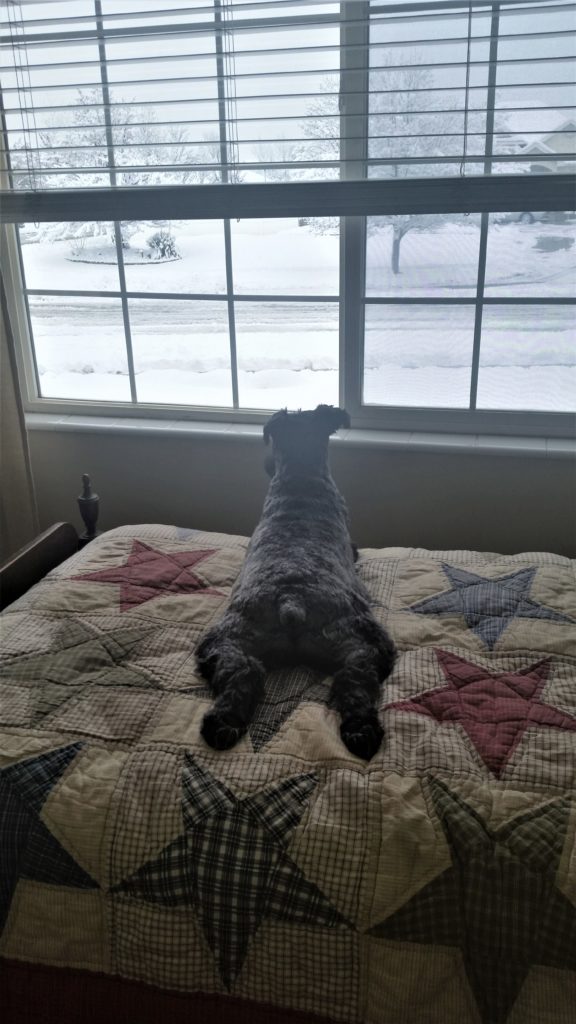
We took Boston to a clinic in Salt Lake City specializing in eye care for pets and started the process to prepare him for cataract surgery. That preparation included a trip to the vet for teeth cleaning and an oral exam to ensure that we minimized any potential infections in his body including his mouth. Again I’ll remind anyone reading this that we considered ourselves good parents, but damned if the oral examination didn’t show that he had 14 decaying teeth (out of 42 in dogs) and out they came. We were told by the doctors that tooth decay in diabetic dogs is common due to the excess glucose in their bodies, but it’s a very tough thing to see your little boy missing a third of his teeth.
So now Boston has 14 fewer teeth. We feel like we’ve absolutely failed this dog that we love, and we still haven’t gotten to the part where they fix his cataracts.
December 2017
We got him healthy enough for eye surgery and Boston’s cataracts were removed and replaced with artificial lenses. When we picked him up after surgery he looked like he’d been in a fight with a pit bull, and lost. We were already beating ourselves up for helping cause his disease, and now we had this little dog with a ‘cone of shame,’ a look on his face that said ‘what in the hell did you people do to me?’ and his eyes were sore and swollen and the whole damn scene was almost too much to deal with. Almost.
One thing that I haven’t really mentioned about Boston is that he is a little freakin’ stud of a dog. We brought him home from eye surgery and he honestly didn’t mope around for a second, unlike his parents. He just took it, and did everything that we asked him to do to heal from his surgery. We had a boatload of medicine, I think right after surgery he had nine different medications with a spreadsheet to track all of the daily dosages. He was probably close to 100% healed and happy a month after cataract surgery, about the same time that his eyebrows grew back after being shaved for the operation. We had regular follow-up visits at the eye care clinic over the next year and they believe that his eyesight has been completely restored.
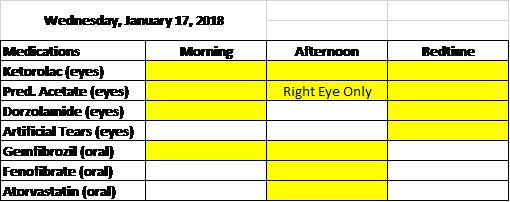
May 2018 to Present
The closest eye care clinic to where we live now is in Las Vegas, so about every three months Boston and I go on a road trip to get his eyes checked. So far, so good. He still has four medications (eye drops) for his eyes that we give to him twice daily for inflammation, tear production, and anti-rejection of the new lenses.
Monitoring and controlling Boston’s diabetic related vital signs has been an ongoing battle since he was diagnosed almost two years ago. One complicating factor is that he is a protective little guy and he gets all kinds of worked up when we take him to the vet for tests (which is like once a week) because of the presence of other dogs and their owners, and that throws off the accuracy of the tests. There are just a myriad of complications with his diabetes that kind of dog pile on (pardon the pun), and numerous organs that can be adversely affected by elevated glucose levels in his blood, which we monitor and medicate him for. He currently has three oral medications that he takes daily along with his insulin and eye drops. The fear is that his kidneys, pancreas, liver, or gall bladder will fail. But other than that, you know, nothing to worry about. 😉
As of right now (February 2019) Boston is doing well! We just changed the type of insulin that he receives from a human derived insulin to a porcine (pig) derived insulin. We haven’t been able to get his glucose levels down consistently to where the doctor is comfortable so we are trying something that we haven’t tried before. One bad thing about the new insulin is that the needle we have to use is longer and thicker, which translates to being more painful to our little guy, twice a day for the rest of his life.
Guess what though? He just sits there and takes it like a big boy.
I titled this post ‘A Cautionary Tale’ because it really is a narrative about something that could happen to any dog owner, or cat owner for that matter, as felines are also susceptible to diabetes. Over the past two years we have gone through at least four veterinary clinics, partly due to trying to find doctors that were skilled enough to treat Boston, and partly because we relocated to Ivins last year. We’ve seen two internal medicine specialists, one in Salt Lake City and one in Vegas, and taken him to two eye care clinics.
We probably have averaged about three clinic visits per month over the past two years. Boston has been to the doctor so many times in his little life that when the veterinary techs come to get him in the waiting room he immediately trots over and stands on the scale, whether they want him to or not. It’s cute, and sad at the same time, because he just knows the drill. Boston’s diabetes has changed our lives, we adhere to a daily schedule that doesn’t allow for much flexibility and essentially prohibits Robin and me from travelling anywhere together without him overnight. This has been a journey that neither of us has any regrets about though. We didn’t volunteer for this, but once he was diagnosed there was never a question that we would do whatever we could to give him the highest quality of life possible for as long as he lives.
Again, just a cautionary tale for anybody that is confronted with this diagnosis of your pet so that you are aware of what you may be in for, and a warning to be very aware of your pet’s nutrition and their physical and dental health! Our ‘little’ Schnauzer, Jordy, has been on the same diet as Boston since his diagnosis and we can only cross our fingers that he will avoid the disease that his brother is living with. If Jordy gets diabetes, we will at least know that we did our best to prevent the human caused factors and then we will do what we can to make his life as happy as possible for as long as possible.
